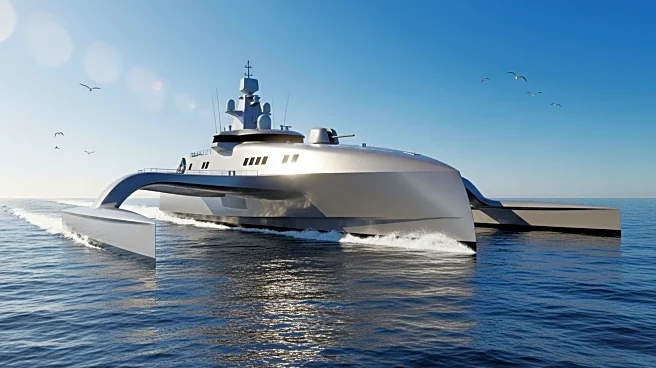What's Happening?
BAE Systems is revisiting the trimaran hullform as part of its Deployed Sensor/Effector Platform concept, presented at DSEI 2025 in London. The company aims to leverage knowledge from previous sea trials of the trimaran demonstrator RV Triton, conducted in the early 2000s, to develop a future lean-crewed or uncrewed vessel. This initiative is part of the Royal Navy's (RN) strategy to introduce medium to large unmanned surface vehicles (USVs) to enhance fleet mass and lethality. The First Sea Lord General Gwyn Jenkins emphasized the transition to a digitally connected fleet comprising crewed, uncrewed, and autonomous platforms, which will redefine maritime military power.
Why It's Important?
The exploration of trimaran hullforms by BAE Systems signifies a shift towards more versatile and efficient naval platforms. This development is crucial for the Royal Navy's strategic goal of increasing its operational capabilities through unmanned systems. The integration of uncrewed vessels could lead to enhanced air and missile defense capabilities and improved anti-submarine warfare operations, particularly in the North Atlantic. This move could potentially reduce operational costs and increase the adaptability of naval forces, impacting defense strategies and military procurement policies.
What's Next?
The Royal Navy plans to have the first uncrewed escort ships operational within the next two years, with further scaling across the fleet anticipated. This progression will likely involve continued research and development, as well as potential collaborations with other defense contractors. Stakeholders, including military leaders and defense industry players, will be closely monitoring the implementation and effectiveness of these new platforms in real-world scenarios.
Beyond the Headlines
The shift towards uncrewed naval platforms raises questions about the future of naval warfare and the ethical implications of autonomous military systems. It also highlights the increasing importance of digital connectivity and cybersecurity in defense operations. Long-term, this could lead to significant changes in naval training, personnel requirements, and international maritime law.









